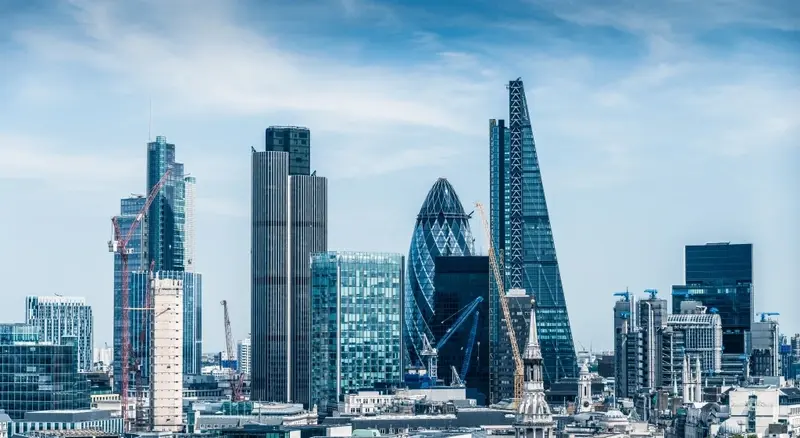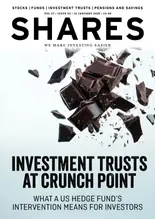
Stock market focus on Wednesday shifted for a day from inscrutable central bankers to mixed company trading updates, leaving London’s large-cap index higher and other measures lower.
The FTSE 100 achieved an early rise amid an absence of further hawkish comments from US central bankers on Tuesday. However, gains may be short-lived if Thursday’s US inflation print comes in hot.
Mid- and small-cap stocks were faring less well, with FTSE 250-listing Direct Line Insurance down 28% after saying it needs to skip paying a final dividend.
The FTSE 100 index was up 26.01 points, or 0.3%, at 7,720.50 early Wednesday. The FTSE 250 was down 19.48 points, or 0.1%, at 19,371.49, and the AIM All-Share was 1.87 points, or 0.1%, higher at 849.12.
The Cboe UK 100 was up 0.3% at 772.08, but the Cboe UK 250 was down 0.5% at 16,842.48. The Cboe Small Companies was down 0.2% at 13,732.67.
In European equities on Wednesday, the CAC 40 in Paris and the DAX 40 in Frankfurt both were 0.2% higher.
The Shanghai Composite in China closed 0.2% lower, but the Hang Seng in Hong Kong rose 0.5%. The Nikkei 225 added 1.0% in Tokyo, while Sydney’s S&P/ASX 200 rose 0.9%.
The dollar struggled in Asian trade, but perked up slightly after the London equities open.
The pound traded at $1.2145 early Wednesday in London, unchanged from $1.2146 late Tuesday, but down from $1.2177 earlier in the morning.
The euro climbed to $1.0735 from $1.0724, though it faded from an intraday high of $1.0757. Against the yen, the dollar edged rose to JP¥132.62 from JP¥132.29.
Fed Governor Michelle Bowman on Tuesday said ‘unemployment has remained low as we have tightened monetary policy and made progress in lowering inflation’, in a prepared speech to an event in Florida.
‘I take this as a hopeful sign that we can succeed in lowering inflation without a significant economic downturn,’ she added.
Her comments came after Fed Chair Jerome Powell avoided future policy in a speech in Stockholm. He did, however, stress the importance of central bank independence.
Thursday’s US consumer price index reading will be one of the stock market’s first major tests of the year. Equity investors will be hoping December’s annual reading comes in at or below the FXStreet-cited market consensus of 6.5%, which would be a slowdown from 7.1% in November.
Analysts at Lloyds Bank commented: ‘Recent indications from a number of economies, including both the eurozone and the US, that inflation has peaked is pushing down bond yields and market expectations for policy interest rate rises. Tomorrow’s US CPI seems certain to show further a fall in headline inflation given the recent decline in energy prices, while core goods inflation may have fallen again on signs that bottlenecks have eased. However, services inflation may go up again, given that tight labour markets seem still to be fuelling domestic cost pressures.’
In London, JD Sports added 4.7%, the best FTSE 100 performer. Peer Frasers, owner of Sports Direct, climbed 2.8%.
JD Sports said revenue growth quickened in the run-up to Christmas, with the athleisure retailer now expecting annual profit at the top end of market expectations.
JD Sports said organic revenue in the six weeks to December 31 jumped more than 20% from a year before. In the 22 weeks to the end of December, organic revenue rose more than 10% annually. Organic annual growth picked up from 5% in the first-half.
JD Sports now expects pretax profit before exceptional items for the financial year ending January 28 at the top end of a £933 million and £985 million market consensus range. The very top of that range represents growth of 4.0% from £947.2 million the year prior.
Sainsbury’s enjoyed a bumper Christmas, though the market was unimpressed. Its shares fell 2.8%. The grocer dragged industry peer Tesco 1.3% lower.
Sainsbury’s said its Christmas grocery volumes outperformed the market. In the six weeks to January 7, total retail sales, excluding fuel, grew 7.1% year-on-year.
They were 9.6% higher on three years earlier. Grocery sales alone climbed 7.1% annually during the six-week period, surging 15% on pre-virus times. In the 16 weeks to January 7, the grocer’s third-quarter, retail sales rose 5.2% year-on-year.
Sainsbury’s now expects underlying pretax profit for the financial year ending in March to be towards the upper end of £630 million to £690 million guidance. This would be down from £730 million a year earlier, however.
Third Bridge analyst Orwa Mohamad noted that discount chains are chipping away at the grocer’s market share.
‘Sainsbury’s is fighting a rearguard action to maintain its gross profit margins by carefully passing on extra costs to customers. However, every day that the cost-of-living crisis persists lends greater strength to the likes of Aldi and Lidl as their store numbers grow and the stigma of using discounters melts away,’ Mohamad commented.
Barratt Developments fell 2.2% after it warned that the UK housing market has suffered a slowdown.
In the six months to December 31, total home completions, including joint ventures, rose annually to 8,626 from 8,067. Its sales rate weakened, however, to 0.44 net private reservations per active outlet per week, from 0.79 a year earlier.
Barratt added: ‘Assuming net reservation rates increase in line with normal spring trading patterns to around 0.50 homes per active outlet per week, we will remain on track to deliver consensus total home completions of 17,475.’
It warned home completions will be below consensus and in the range of 16,000 to 16,500 should there not be spring housing market recovery.
Taylor Wimpey fell 1.4% in a negative read-across.
It was Admiral that was the worst large-cap performer, however, slumping 13% on bad news from FTSE 250-listed peer Direct Line, whose shares plunged 28%.
Direct Line will not declare a final dividend for 2022, as the insurer’s fourth quarter was marred by an increase in claims due to cold December weather.
It expects claims from the ‘freeze event’ to be roughly £90 million in its Home & Commercial arm. Combined with another cold snap around this time last year, as well as developments in the summer, Direct Line expects total weather-related claims of £140 million for 2022, almost double its expectation of £73 million.
Claims inflation remains a ‘feature’ in its Motor arm, meanwhile. With the absence of a final payout, Direct Line’s total dividend for the year will amount to 7.6 pence, down from 22.7p in 2021.
‘A disastrous quarter, stock down 28% this morning, but the rebasing of shares could provide an entry point for plucky investors,’ remarked Marc Kimsey at stock broker Frederick & Oliver.
‘The Q4 claims and portfolio write down amounts to approximately £195 million, equal to what the company will recover by cancelling the final dividend. Not ideal for investors but astute handling by the management team to balance the books and put Q4 behind them.’
Elsewhere in London, newspaper publisher Reach plunged 29%.
Reach said revenue in the fourth quarter to December 25 dropped 4.2% year-on-year. Annual revenue was 2.3% lower.
During the final quarter, advertising revenue alone dropped 20%.
‘During 2023 we are currently targeting further savings of at least £30 million to help mitigate the impact of macro pressures and support our investment in transitioning to a more digitally-led and profitable future for all stakeholders,’ it said.
Lookers was up 6.1%. The motor dealer’s cheery trading update included an improved performance in both used and new car operations, as well as a deal with an unnamed Chinese electric vehicle manufacturer, which is eyeing entry to the UK market.
‘We are delighted that we will be representing a leading global Chinese EV manufacturer on their entry into the UK market, from existing locations in the North East, South Yorkshire and Northern Ireland. In addition, we are pleased to add the iconic MG brand to our brand relationships and will represent MG from our existing site in Worcester,’ Lookers said.
The company expects underlying pretax profit of over £80 million in 2022, down from £90.1 million in 2021. The prior year’s figure included £9.8 million of Covid-19 support.
Brent oil was quoted at $79.91 a barrel early Wednesday, up slightly from $79.74. Gold traded at $1,882.71 an ounce, rising from $1,875.50.
Copyright 2023 Alliance News Ltd. All Rights Reserved.




